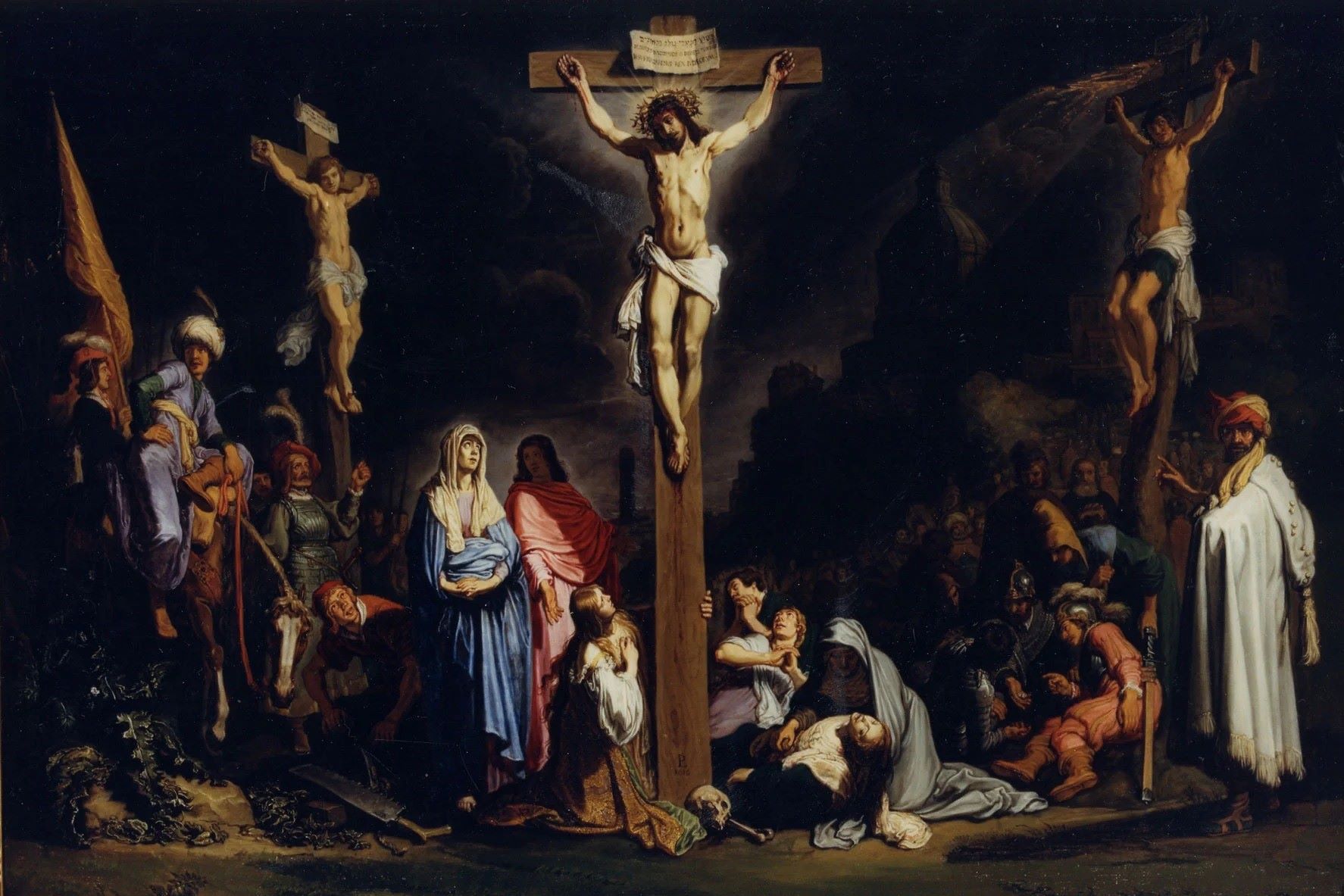Home>Theology and Spirituality>What Does Augustine Believe About Christianity


Theology and Spirituality
What Does Augustine Believe About Christianity
Published: February 10, 2024
Peter Smith, Editorial Director at Christian.net, combines deep insights into faith, politics, and culture to lead content creation that resonates widely. Awarded for his contributions to religious discourse, he previously headed a major organization for religious communicators, enhancing dialogue on faith's societal impacts.
Discover Augustine's beliefs about Christianity and theology in this insightful exploration of spirituality and faith. Gain a deeper understanding of his influential perspectives.
(Many of the links in this article redirect to a specific reviewed product. Your purchase of these products through affiliate links helps to generate commission for Christian.net, at no extra cost. Learn more)
Table of Contents
Introduction
Augustine of Hippo, also known as Saint Augustine, was a prominent theologian and philosopher whose profound influence on Christian thought continues to resonate through the centuries. Born in 354 AD in Roman Africa, Augustine's journey from a life of youthful indiscretions to becoming one of the most significant figures in the history of Christianity is a testament to the transformative power of faith and reason. His intellectual prowess, coupled with his spiritual fervor, led to the development of profound theological insights that have shaped the Christian tradition.
Throughout his life, Augustine grappled with questions of human nature, the existence of evil, the nature of God, and the relationship between faith and reason. His writings, particularly his seminal work "Confessions" and "The City of God," continue to be studied and revered for their depth of insight and eloquence. Augustine's exploration of these profound theological and philosophical questions has left an indelible mark on Christian theology, shaping the way in which believers understand their faith and the world around them.
In this article, we will delve into Augustine's beliefs about Christianity, examining his views on the nature of God, the role of grace, sin and salvation, the importance of faith and reason, and his enduring influence on Christian theology. By exploring Augustine's profound insights, we can gain a deeper understanding of the rich tapestry of Christian thought and the enduring relevance of his teachings in the contemporary world.
Augustine's Conversion to Christianity
Augustine's journey to Christianity is a compelling narrative that reflects the transformative power of faith. Born to a pagan father and a devout Christian mother, Monica, Augustine was exposed to diverse religious influences from an early age. However, during his youth, he strayed from his mother's Christian teachings and embarked on a tumultuous path marked by intellectual curiosity and moral recklessness.
It was during his studies in Carthage that Augustine encountered the Manichaean sect, which espoused a dualistic worldview that deeply resonated with his philosophical inclinations. Entranced by the Manichaean belief in the coexistence of good and evil as opposing cosmic forces, Augustine embraced this ideology, finding solace in its seemingly rational explanations for the existence of evil in the world.
Despite his fervent adherence to Manichaeism, Augustine's quest for truth and meaning remained unfulfilled. His intellectual pursuits led him to the study of Neoplatonism, a philosophical system that emphasized the existence of a transcendent reality beyond the material world. Through the teachings of Neoplatonism, Augustine grappled with profound metaphysical questions, seeking to reconcile the nature of the divine with the complexities of human existence.
However, it was not until his encounter with the renowned bishop, Ambrose of Milan, that Augustine experienced a profound spiritual awakening. Ambrose's eloquence and wisdom captivated Augustine, igniting a deep longing for spiritual fulfillment. Through his interactions with Ambrose and the study of sacred scriptures, Augustine underwent a profound inner transformation, culminating in his conversion to Christianity.
The pivotal moment of Augustine's conversion occurred in a garden in Milan, where he experienced a profound encounter with the divine. Overwhelmed by a sense of spiritual clarity and conviction, Augustine underwent a profound conversion, embracing the Christian faith and committing himself to a life of devotion and contemplation.
Augustine's conversion to Christianity marked a profound turning point in his life, setting the stage for his remarkable intellectual and spiritual contributions to Christian theology. His journey from intellectual skepticism to unwavering faith serves as a testament to the enduring power of divine grace and the transformative potential of the human spirit.
In the wake of his conversion, Augustine's profound insights and theological acumen would come to shape the course of Christian thought, leaving an indelible mark on the development of Christian theology and spirituality. His conversion stands as a testament to the enduring power of faith and the transformative potential of encountering the divine in the midst of life's complexities.
The Nature of God According to Augustine
At the heart of Augustine's theological framework lies a profound exploration of the nature of God. Central to his understanding is the concept of God as the ultimate source of all existence, transcending the limitations of human comprehension. Augustine's conception of God is deeply rooted in the Christian tradition, drawing from biblical teachings and philosophical insights to articulate a vision of the divine that encompasses both immanence and transcendence.
For Augustine, God is the ineffable and omnipotent creator of the universe, whose divine attributes encompass omnipotence, omniscience, and omnipresence. Through his seminal work "The City of God," Augustine expounds upon the divine nature, emphasizing God's eternal and unchanging essence. He posits that God exists outside the constraints of time and space, encompassing all of creation within the boundless expanse of divine providence.
Furthermore, Augustine's understanding of God is intricately intertwined with the concept of divine love and benevolence. He portrays God as the embodiment of perfect love, whose divine grace extends unconditionally to all of creation. Augustine's theological reflections on the nature of God emphasize the divine benevolence that permeates the fabric of existence, offering solace and redemption to humanity.
In addition, Augustine grapples with the enigma of evil within the context of God's nature, delving into the complexities of divine providence and human suffering. His exploration of theodicy seeks to reconcile the existence of evil with the benevolent nature of God, ultimately affirming the inscrutable wisdom of divine providence in the face of human tribulations.
Moreover, Augustine's conception of the Trinity, as articulated in his treatise "On the Trinity," elucidates the dynamic interplay of Father, Son, and Holy Spirit within the divine unity. His reflections on the Trinity underscore the relational nature of God, portraying the divine persons as eternally united in perfect harmony and love.
In essence, Augustine's vision of the nature of God encompasses the ineffable majesty of the divine, the boundless compassion of divine love, and the enigmatic mystery of divine providence. His profound insights continue to inspire contemplation and reverence, inviting believers to embark on a spiritual journey of discovery and awe in the presence of the transcendent and immanent God.
The Role of Grace in Augustine's Theology
At the core of Augustine's theological framework lies a profound emphasis on the transformative power of divine grace. Central to his theological reflections is the concept of grace as the unmerited and boundless gift of God's benevolence, bestowed upon humanity for the redemption and sanctification of the soul. Augustine's exploration of grace permeates his writings, illuminating the contours of human existence and the ineffable mystery of divine intervention in the lives of individuals.
Augustine's understanding of grace is intricately intertwined with his profound reflections on the human condition and the inherent frailty of human nature. In his seminal work "Confessions," Augustine candidly recounts his own spiritual journey, grappling with the complexities of sin and the yearning for spiritual fulfillment. Through his introspective narrative, Augustine unveils the transformative impact of divine grace in the context of his own life, portraying grace as the catalyst for inner renewal and spiritual awakening.
Furthermore, Augustine articulates the concept of "prevenient grace," emphasizing the divine initiative that precedes human response. He elucidates the notion that God's grace operates prior to human volition, drawing individuals toward the divine in a movement of unmerited favor. Augustine's theological insights on prevenient grace underscore the primacy of divine agency in the process of salvation, affirming the sovereign and compassionate nature of God's redemptive work in the lives of believers.
Moreover, Augustine's reflections on grace extend to the concept of "efficacious grace," wherein he expounds upon the transformative power of divine grace in effecting the regeneration of the human soul. Augustine portrays grace as the divine agent of spiritual renewal, permeating the depths of the human heart and bestowing the gift of faith and repentance. His theological articulation of efficacious grace underscores the profound impact of divine intervention in the process of salvation, illuminating the transformative potential of grace in the lives of believers.
In essence, Augustine's theology of grace stands as a testament to the boundless compassion and redemptive power of God's benevolence. His profound insights into the nature of grace continue to inspire contemplation and reverence, inviting believers to embrace the transformative potential of divine grace in their spiritual journey toward redemption and sanctification.
Augustine's Views on Sin and Salvation
Augustine's profound theological reflections on sin and salvation have left an indelible mark on Christian thought, shaping the way believers understand the complexities of human nature and the redemptive work of God. Central to Augustine's understanding is the concept of original sin, which he expounds upon in his seminal work "Confessions" and "The City of God." Augustine posits that the inheritance of original sin from Adam, the first human, has permeated the entirety of human existence, rendering humanity inherently prone to moral frailty and spiritual estrangement from God.
In Augustine's theological framework, the pervasive influence of original sin underscores the profound depths of human depravity, highlighting the inherent inclination toward moral transgression and spiritual alienation. His reflections on the nature of sin emphasize the inescapable reality of human fallenness, portraying sin as a pervasive force that disrupts the harmony of creation and estranges humanity from the divine.
Furthermore, Augustine's exploration of sin extends to the concept of concupiscence, wherein he elucidates the enduring effects of sinful inclination within the human heart. He portrays concupiscence as the lingering residue of original sin, permeating the human will and rendering individuals susceptible to moral frailty and spiritual waywardness. Augustine's profound insights into the nature of concupiscence underscore the enduring impact of sin on the human condition, illuminating the complexities of moral agency and the perennial struggle against sinful impulses.
In the context of salvation, Augustine articulates the transformative power of divine grace as the redemptive antidote to the pervasive influence of sin. His theological reflections on salvation emphasize the unmerited benevolence of God, who extends the gift of grace to humanity for the restoration and renewal of the soul. Augustine's vision of salvation encompasses the ineffable mystery of divine intervention, wherein grace operates as the catalyst for inner transformation and spiritual renewal.
Moreover, Augustine's understanding of salvation extends to the concept of predestination, wherein he grapples with the enigmatic interplay between divine sovereignty and human agency. His theological articulation of predestination underscores the inscrutable wisdom of God's redemptive purposes, affirming the sovereign agency of divine grace in the process of salvation.
In essence, Augustine's profound insights into sin and salvation offer a compelling vision of human fallenness and divine redemption, inviting believers to contemplate the enduring relevance of his theological reflections in the context of their own spiritual journey. His exploration of sin and salvation continues to inspire contemplation and reverence, illuminating the transformative potential of divine grace in the context of human frailty and the enduring hope of redemption.
Read more: What Did Augustine Believe In
The Importance of Faith and Reason in Augustine's Thought
Augustine's profound exploration of the interplay between faith and reason stands as a cornerstone of his theological and philosophical framework. Central to his thought is the dynamic tension between the faculties of faith and reason, wherein he grapples with the complexities of human cognition and the ineffable mysteries of divine revelation. Augustine's nuanced articulation of the importance of faith and reason offers profound insights into the nature of belief, the pursuit of truth, and the harmonious integration of intellectual inquiry and spiritual conviction.
At the heart of Augustine's reflections on faith and reason lies a profound recognition of the intrinsic human longing for truth and meaning. He acknowledges the inherent tension between the limitations of human understanding and the transcendent mysteries of divine revelation, emphasizing the complementary roles of faith and reason in the pursuit of ultimate truth. Augustine's vision of faith as the gateway to divine illumination and reason as the instrument of intellectual inquiry underscores the harmonious interplay between these faculties in the quest for spiritual and intellectual fulfillment.
Furthermore, Augustine's exploration of faith and reason extends to the concept of intellectual humility, wherein he emphasizes the necessity of cultivating a receptive disposition toward divine revelation. He posits that genuine faith entails a willingness to transcend the confines of human intellect and embrace the ineffable mysteries of divine truth, acknowledging the limitations of human reason in apprehending the transcendent realities of the divine. Augustine's profound insights into the importance of intellectual humility underscore the transformative potential of faith in transcending the boundaries of human cognition and embracing the enigmatic mysteries of divine revelation.
Moreover, Augustine's vision of faith and reason encompasses the harmonious integration of intellectual inquiry and spiritual conviction, wherein he elucidates the complementary roles of these faculties in the pursuit of truth. He emphasizes that faith and reason are not mutually exclusive but rather mutually enriching, offering distinct yet interconnected pathways to the apprehension of ultimate truth. Augustine's profound insights into the harmonious integration of faith and reason invite believers to embark on a journey of intellectual and spiritual discovery, embracing the transformative potential of these faculties in the pursuit of transcendent wisdom and spiritual enlightenment.
In essence, Augustine's exploration of the importance of faith and reason offers a compelling vision of the harmonious integration of intellectual inquiry and spiritual conviction, inviting believers to embrace the transformative potential of these faculties in their quest for ultimate truth and spiritual fulfillment. His profound insights continue to inspire contemplation and reverence, illuminating the enduring relevance of faith and reason in the context of the human longing for transcendent wisdom and divine illumination.
Augustine's Influence on Christian Theology
Augustine of Hippo's profound influence on Christian theology is a testament to the enduring impact of his theological and philosophical insights. His prolific writings and profound intellectual acumen have left an indelible mark on the development of Christian thought, shaping the contours of theological discourse and spiritual reflection for centuries.
One of Augustine's most enduring contributions to Christian theology lies in his articulation of the doctrine of original sin. His profound reflections on the pervasive influence of sin and the inherent fallenness of human nature have significantly shaped the Christian understanding of the human condition and the redemptive work of Christ. Augustine's emphasis on the enduring effects of original sin has permeated the theological landscape, informing the way believers comprehend the complexities of moral agency and the transformative power of divine grace.
Furthermore, Augustine's exploration of the nature of God and the Trinity has profoundly influenced the development of Christian doctrine. His nuanced articulation of the divine attributes, the relational dynamics within the Trinity, and the ineffable mystery of divine providence has enriched the theological discourse, inviting believers to contemplate the transcendent majesty of the divine and the enduring relevance of these theological insights in their spiritual journey.
Moreover, Augustine's profound reflections on the interplay between faith and reason have significantly shaped the Christian understanding of the harmonious integration of intellectual inquiry and spiritual conviction. His emphasis on the complementary roles of faith and reason in the pursuit of truth has inspired generations of theologians and philosophers, inviting believers to embrace the transformative potential of these faculties in their quest for spiritual enlightenment and intellectual fulfillment.
In addition, Augustine's theological articulation of the nature of grace and the redemptive agency of divine benevolence has profoundly influenced the Christian understanding of salvation and sanctification. His emphasis on the unmerited and transformative nature of grace has enriched the theological discourse, inviting believers to contemplate the enduring impact of divine intervention in the process of spiritual renewal and inner transformation.
In essence, Augustine's enduring influence on Christian theology continues to resonate through the centuries, inviting believers to engage with the rich tapestry of his theological insights and philosophical reflections. His profound contributions have enriched the Christian tradition, shaping the way believers comprehend the complexities of human existence, the nature of God, and the transformative power of divine grace. Augustine's enduring legacy stands as a testament to the enduring relevance of his theological and philosophical insights in the contemporary world, inspiring contemplation and reverence among believers and scholars alike.














